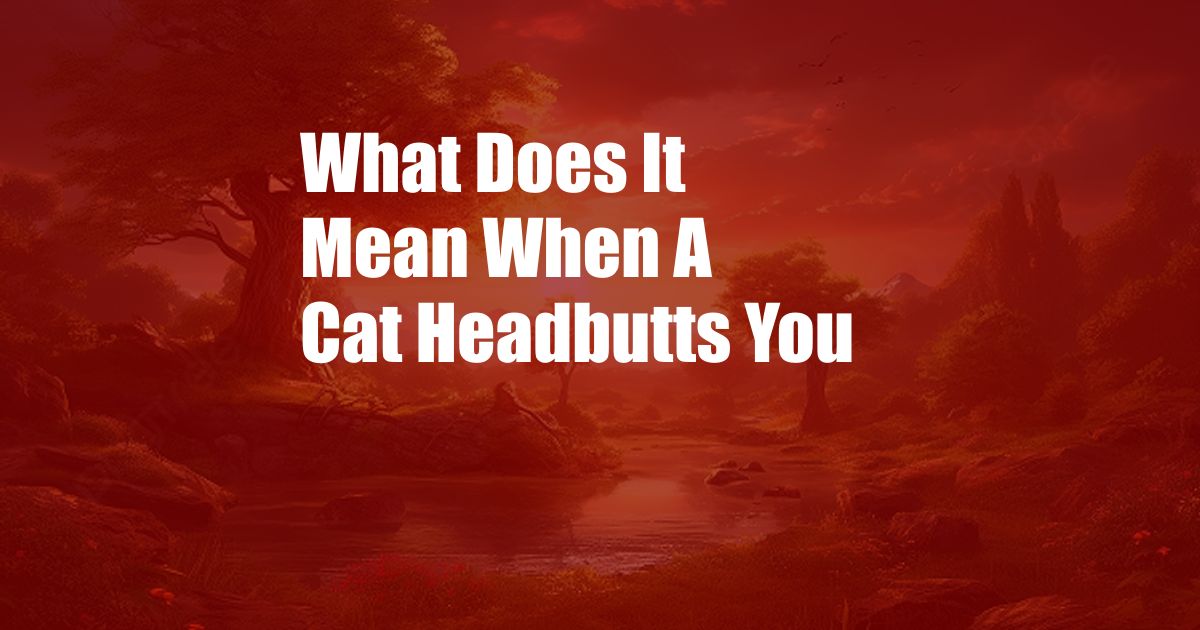
**Why Do Cats Headbutt You? What It Means and How to Respond**
Cats are enigmatic creatures, known for their fascinating behaviors. One of the most common feline actions is headbutting, where they gently bump their heads against you or objects. While seemingly harmless, this behavior conveys significant meaning, offering insights into your cat’s emotions and intentions. Delving into the world of cat headbutting unveils a complex tapestry of feline communication, revealing the hidden messages behind this endearing gesture.
As you explore the depths of cat headbutting, remember that each cat is unique, and their headbutting behavior may vary slightly. Observing your cat’s body language and context clues can help you decipher the specific message they’re trying to convey.
**Scent Marking and Ownership**
One of the primary reasons cats headbutt is to mark their territory with scent glands located on their heads. By rubbing their heads against you, they deposit pheromones, invisible chemical signals, which create a sense of familiarity and security. This behavior is particularly common in multi-cat households, where cats establish their presence and ownership of shared spaces.
Headbutting also serves as a form of bonding and social interaction. When cats headbutt you, they create a positive association with your presence, further strengthening the bond between you and your feline companion. This non-threatening gesture communicates affection, trust, and contentment.
**Attention Seeking**
Headbutting can be a subtle way for cats to request attention. If your cat approaches you and repeatedly headbutts your legs or face, they may be seeking your affection, a playtime session, or a simple acknowledgment of their presence. Responding to their headbutts with attention and interaction reinforces their behavior and encourages them to continue expressing their affection.
However, it’s important to note that excessive headbutting for attention can sometimes indicate an underlying medical condition, such as hyperthyroidism or anxiety. If you notice a sudden change in your cat’s headbutting behavior, consult with your veterinarian to rule out any potential health issues.
**Greeting and Affection**
When cats approach you with a friendly and relaxed demeanor and gently headbutt you, they’re likely expressing their affection and greeting you. This behavior is especially common when you return home after being away or when they wake up from a nap and see you nearby.
In these situations, headbutting serves as a non-verbal expression of love and appreciation for your presence. It’s a way for cats to communicate their happiness and contentment with your companionship.
**Tips for Responding to Cat Headbutts**
Understanding the meaning behind cat headbutts empowers you to respond appropriately, strengthening the bond between you and your furry friend. Here are some expert tips for interacting with headbutting cats:
- Reciprocate the Affection: When your cat headbutts you, gently return the gesture by petting them or giving them a soft head scratch. This shows them that you appreciate their affection and reinforces their positive behavior.
- Positive Reinforcement: Reward your cat with treats or playtime whenever they headbutt you appropriately. This positive reinforcement encourages them to continue expressing their affection in a desirable manner.
**FAQ on Cat Headbutting**
Q: Why does my cat headbutt me only after I feed them?
A: Headbutting after feeding can be a way for your cat to express gratitude for the food and reinforce the positive association between you and mealtime.
Q: My cat headbutts other cats, but not me. What does this mean?
A: Cats have individual preferences, and some may be more selective about who they headbutt. It doesn’t necessarily indicate a lack of affection towards you.
Q: Should I be concerned if my cat suddenly starts headbutting excessively?
A: While headbutting is generally a positive behavior, excessive headbutting can sometimes indicate an underlying medical condition or anxiety. Consult with your veterinarian to rule out any potential health issues.
**Conclusion**
Cat headbutting, a seemingly simple act, is a complex and multifaceted behavior that conveys a wide range of emotions and intentions. By understanding the meaning behind this gesture, you can deepen your connection with your cat and respond appropriately, nurturing a harmonious and affectionate bond. Remember, each cat is unique, and observing their body language and context clues is key to deciphering their headbutts accurately.
Have you experienced any fascinating or endearing headbutting moments with your cat? Share your stories and insights in the comments below!